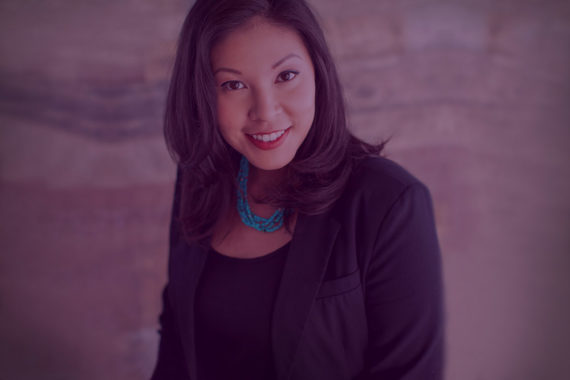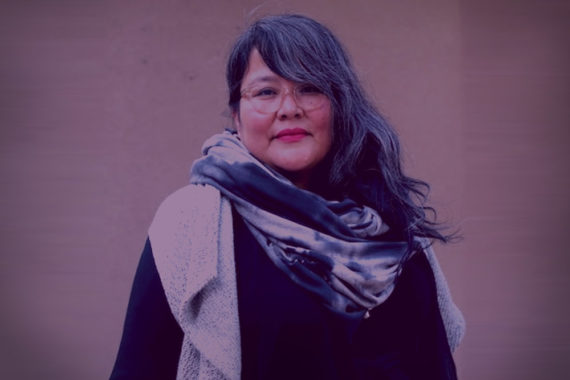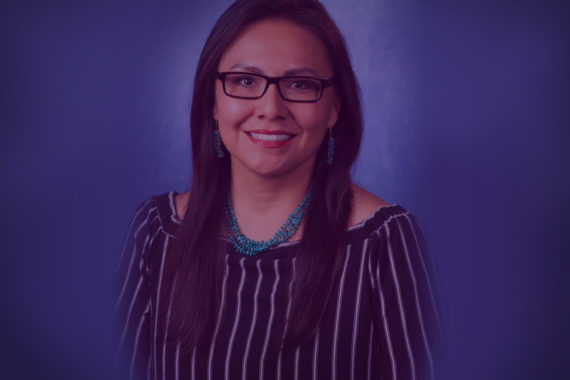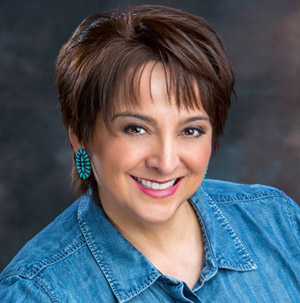
Stephine Poston of Poston LLC
Welcome to a special season of Pitch Makeover, recorded at the Native Women’s Business Summit. In this episode, Natalia is joined by Stephine Poston of Poston LLC, a strategic communicator who knows her strengths, and is ready to bring in expert resources to chase bigger government contracts. Plus, Jaime Gloshay joins us for the Investor Take.
The Native Women’s Business Summit returns April 5th and 6th. Tickets and more info at NativeWomenLead.org.
EPISODE TRANSCRIPT
Gina: Welcome back to a special edition of Pitch Makeover, recorded at the Native Women’s Business Summit. I’m Executive Producer Gina Delvac. Here at Pitch Makeover, we’ve introduced a land acknowledgment practice, who is Woodland Cree, and Chief of Staff at Pipeline Angels.
The Native Women’s Business Summit was held, and these episodes were recorded, on Pueblos land, due to white colonizers. To learn more and find out whose stolen land you’re on, search for the Native Land app.
We’re grateful to Anisa for guiding the creation of this land acknowledgment, which we’ll include in this special edition and future seasons of Pitch Makeover.
Natalia: Hey everyone, it’s Natalia, host and creator of Pitch Makeover. We are back in the studio for our Native Women’s Business Summit special edition, thrilled to be interviewing our next Native woman entrepreneur Stephine Poston from Poston and Associates. Stephine is from Sandia Pueblo and we’re excited to have you on the hot seat, Stephine! Welcome.
Stephine: Thank you so much.
Natalia: So without any further ado – are you ready to pitch?
Stephine: I’m ready. Let’s go.
Natalia: Okay. Ready? Set? Go!
Stephine: Hi everybody my name is Stephine Poston. I’m a Native Woman-Owned Small Business. I am HUBZone and Economically Disadvantaged-Owned Small Business as well. My website is PostonLLC.com and my – what I love to deliver in Indian country is strategic facilitation and communications marketing. I have recently been named by Score as a Small Business Champion in 2018. I was also nationally named Native Woman Business Owner of the Year in 2017 and in 2016 a New Mexico Woman of Influence.
I’ve really had a wonderful opportunity to work with Native communities and I learned all the great expertise and knowledge working for my own tribe the Pueblo of Sandia. And so I’ve had this wonderful growing business and I’ve been able to attain these government…the HUBZone and Economically Disadvantaged-Owned Small Business profiles, but now I need to use them and scale up and I need to use them and scale up by creating some sort of systems because those processes can be very overwhelming but they are very much looking for HUBZone and Economically Disadvantaged-Owned Small Businesses and I have not used those and I’m ready to use them, I have those certifications, I need the funding to move that forward with creating systems and really tightening up my branding and my marketing efforts.
So I am in pursuit of some funding in the amount of $80,000USD to create the systems and upgrade my branding and marketing and better equip myself and my dugout to respond to these government contracts and RFPs.
Natalia: Awesome! That was two minutes and seven seconds. I’m just, like, finishing up my notes.
Stephine: Are we still live?
Natalia: Yes we are.
Stephine: Awesome.
Natalia: I’m just, like, writing down all of the stuff and I do have some questions, Stephine, for you. I guess my first question, and please, you know – what is HUBZone? Tell me more about HUBZone.
Stephine: HUBZone is a certification from the federal government where you live in an economically disadvantaged area and the employees that work from you are also from those areas and they try and boost economic development in those HUBZone areas and every Indian reservation in the country is considered a HUBZone.
Natalia: And so what does getting that certification mean?
Stephine: What that means is when the government puts out contracts they have certain percentage of their work that has to go to HUBZone and economically disadvantaged women entrepreneurs or business owners. And so those set asides are there for us and they do not have enough people applying for their programs or responding to the RFPs that come out.
Natalia: So, and this is, like, the second episode that I might be quoting Michelle Justice because Michelle was just so amazing yesterday. So, number one: thank you for even creating it. I did want to give another extra special shout-out to Stephine. Stephine is one of the of the co-creators, co-founders, of the Native Women’s Business Summit and the reason that I’m here in Albuquerque so just…thank you for that labour of love, commitment, passion, inclusion, and the – I’m trying to remember all the special words, you know, like, the weaving that happened yesterday; the empowerment; the back-bone. You know? Like, you all co-creators, co-founders, really…you embody those values. So, just a moment to, you know, like, thank you. And I’ve been on the other side of, like, event planning so the day – getting to hang out with you the day after is really special, Stephine. So thank you for that.
Stephine: Oh, absolutely! It was great and I also got to attend your breakout panel and that was really great as well and you had a lot of people interested and asking all of the right questions and I thought to myself: “Wow. If I had been exposed to that sort of funding early on or those other opportunities or different ways to look at how to grow your business, goodness knows what could have happened.” But that’s not the point. That’s behind us, and how do we move forward in bringing those opportunities forward? That’s the whole point of empowering Native business owners.
Natalia: Yeah and a huge part of that is even immediately as you explain was HUBZone is and the reason that I’m excited about doing this special edition, you know, featuring Native women entrepreneurs is because there are certain terms and – oh now I remember now, like – the reason that I was bringing up Michelle Justice is that #LanguageMatters and I remember that Michelle was about to use the word “traditional” and then stopped in the tracks and said, you know, “Mainstream. Mainstream status quo.” And so because tradition and what traditional means changes depending on the culture, depending on the community, depending on where we are and so one of the things that I’m hoping to do in terms of just uplifting all of your stories is mainstreaming your narratives which is so important, uplifting and amplifying the work that you’re doing. And so for the status quo for, like, the mainstream, I think that terms such as “Minority Business Certification” or “Women-owned Business Certification” are much more, you know, familiar terms and so even just finding out and learning about HUBZone which seems like it’s similar to that, right? Because it is a designation, it’s a certification that then is meant to create more opportunities for…I think you mentioned it was, like, economically disadvantaged, you know, like, underserved talent because at the end of the day it’s about talent, right?
Stephine: Right.
Natalia: Like, who – talent that could be benefiting, you know, from the opportunities that these – and for anyone who is wondering what “RFP” stands for it’s “Request For Proposal” that the US government puts out in order to provide opportunities and at the end of the day it’s job creation, and it’s, you know, employment creation, and at the end of the day it is economic development so that’s helpful.
The other thing that I had a couple of other questions you mentioned was…you mentioned that you are seeking $80k in funding and you mentioned creating systems, upgrading branding. Tell me a little bit about what you mean when you say “creating systems.”
Stephine: A lot of the responses to the federal government are not simple “hey put in a three page proposal.” They are extensive and they are complicated. And I think to invest the time, the energy, and the resources to set up the templates, to set up the systems that could help you respond to these quicker, and also partner with some other folks that have that experience, but at some point I’ve got to be the one that takes the lead and be able to say, “I’ve got the systems in place, I’ve got the templates in place, I’ve got the experience, but I also need to team with somebody else who has some more experience,” is going to take some effort and energy and time. That’s really difficult right now because I’m – still have two sons and still trying to pay mortgage and the car, so it’s like how much time do you invest in business development and how much time do you spend with existing clients to make sure that everything’s running in order for them and you are meeting their customer needs?
Natalia: Yeah. And so tell me a little bit about, like, how many current clients do you have?
Stephine: Right now, active clients? I have approximately ten active clients throughout the country both – primarily tribes, tribal entities, and a few non-tribal entities looking to work with tribal nations.
Natalia: What I love about the fact that when you explain what you mean by creating systems is that this is like a one-time cost that then is going to reap so many benefits because those templates, I’m sure, you’re going to be able to use over and over again.
Stephine: Right.
Natalia: Right? So there is that sense of, like, sustainability and scalability in terms of just focusing on these systems.
Have you thought of once you have these systems in place, kind of, like, the “train a trainer”? Like, is that something that then could potentially become another, sort of, revenue stream that then you help others by getting their own systems in place as something else that you could offer as a service?
Stephine: I think so. The other way to look – that could be a service, but I don’t know if that’s my skill set but the other thing that the $80,000USD could potentially do is being able to hire or contract with a business developer who specializes in government contracts and my, sort of, certifications to help me seek those out, match them up with my skill set, with my dugout of contractors and vendors that I use and really zero in on that. I think that could in and of itself could pay for itself pretty quickly. Then I can focus on what I’m good at and that’s being in front of people, facilitating, doing strategic planning in terms of vision and mission and key priority areas, training, working to inspire and encourage other Native business owners. Those are the things that resonate with me and get me up in the morning.
Natalia: Okay so Stephine that was super helpful. Are you ready for your Pitch Makeover?
Stephine: Oh, yeah! Let’s do it.
Natalia: Okay. So I’d say in terms of what I’d love for you to Keep…keep the Small Business Champion. You know, you listed accolades – congrats! All of these honors and awards and achievements. You know, I’m glad that you are being recognized. It also is, like, which of these awards strategically demonstrate your strengths? Right? The first thing you said was you’re a strategic facilitator. So when you said that and thinking about all of the awards that you mentioned, the one that I felt like really resonated was Small Business Champion because you at the end of the day are this resource for small businesses, right? You’re not just a champion, you’re also a resource for them and what you are providing to them is this strategic facilitation. So that recognition in some ways is, like, it ties the bow. Right? Like, in terms of explaining how you’re helping these small businesses and also, like, for potential clients: “Hey this is what I can offer you and I’ve been recognized as a Small Business Champion.” So I really thought that was important.
In terms of – I would also keep the, you know, the HUBZone certification. This is interesting because I’d say this is where like, it’s so important about know your audience. I’m sure that when you’re working with potential clients in tribal lands, etc. they probably already know HUBZone so there’s no need to explain what it is. Right? So, that’s where, like, you could just save yourself, like, some seconds because people already know that acronym. Of course if for some reason – you know, I’m brainstorming out loud – you mentioned that you’re interested in hiring, you know, a business developer who specializes in contracts and just in terms of to make sure we’re on the same page, especially the audience, this person you would be hiring to help you write the Request for Proposals, I’m imagining. Right?
Stephine: Create the templates.
Natalia: And so the thing is that there might be some experts out there who know how to create this template, however, they might not necessarily be familiar with HUBZone. So, like, they might be familiar with the system, right? The system of, like, the Request for Proposals from the US government, however they might not necessarily have that expertise of, like, what you’re bringing to the table. And so even thinking about how yes this pitch that you just did is potentially for some investors, I’d also, you know, put out there that this pitch also could be like for you to connect with, like, “the right” business developer because I’m sure that there are a ton.
I’m going to get very meta – like, an RFP for an RFP, right? I’m sure that there are so many business developers out there that this is an opportunity for you to actually get to meet and connect with different ones and find out who gets you because not everyone is going to get it and not everyone is going to be able to be the interpreter/translator that you deserve. With that said I do think that just adding, you know, just, like a little bit of that explanation. Keep HUBZone.
The other two things that I would say I would love for you to add is…specifically yes, creating systems. At the end of the day you’re talking about hiring expertise and expertise can cost. So just kind of clarifying how you are planning to create these systems is you need to actually hire someone with that expertise. And then the other part that I would say in terms of adding is the job creation. The difference between that $25k contract versus that $250,000 contract is how many jobs you can create. Right? And how many opportunities you’re creating and so that’s something really powerful that you’re saying: “Hey by betting on me, you’re betting on someone who’s going to be creating job opportunities, is going to be hiring more Native peoples.” And I think that that’s really powerful.
The thing that I would Delete because it’s like, how can you add all of these things, keep all that stuff, and still make it, you know, one minute? I’d say just in terms of the recognitions, you know you mentioned New Mexico Woman of Influence, congrats it’s amazing. That also is a little bit more vague than, like, Small Business Champion. Like, I get that one. Right? Like, the name of the award is actually giving me more information that is directly tied to what you do. So maybe either delete New Mexico Woman of Influence or if, you know, they might have said: “You got that for…” you know, and then explain, you know, what was it, you know, that they were recognizing? Because that also gives a little bit more detail in terms of what you’ve done.
To recap, I’d say make sure to keep Small Business Champion, keep, you know, your expertise which is strategic facilitator, keep the HUBZone. I would add, you know, like, specifying your focus is to hire this expert and how this expert is going to help and by helping actually is going to be sustainable and scalable, and then add how, you know, the job creation opportunity of, you know, what you’re – of this goal that you have of creating these systems. And then delete – either delete the other awards or, you know, just provide more context for them so that it ties back into your whole story.
You got that?
Stephine: Yes.
Natalia: Okay are you ready? Set? Go!
Stephine: Hi everybody my name is Stephine Poston. I come from the Sandia Pueblo Indian Nation in New Mexico. I am a Native Woman-Owned Small Business and I specialize in strategic facilitation and strategic communications. I am looking for some support as a HUBZone certified company which is a way for government contracting processes – I am looking for some support to hire expertise to create systems to secure larger government contracts. By doing this I would be able to increase jobs, I would become more sustainable and more scalable, and really be able to focus on the things that I am really good at by hiring out the expertise and allow me to do more of the things I’ve done by being named the 2018 Small Business Champion.
Natalia: That was one minute and one second. That’s amazing, Stephine. How did it feel? What are your thoughts regarding the do-over?
Stephine: It’s cleaner. It’s more focused. A little push helps a lot. Thank you!
Natalia: I love that you mentioned the more focused because oftentimes, you know, potential investors out there, they don’t have a lot of time. So, like, getting to the point, you made it easier for someone to understand how they could help and you also, kind of, connected the dots. Right? Like, “So the reason I need this expert is so that we can scale. Which then means that I can hire more people.” And what I love that you – actually, kind of, like, the way that you ended it was like, “so that I can do more of what I’m great at,” which, investors aren’t expecting founders to do everything. You know, that’s just not realistic. Investors want to invest in people and fund people who understand what their strengths are and understand what they need. And the need could be, like, hiring it out, outsourcing, or it could be bringing someone onto the team. So I love that you shared that.
Thank you for, like, putting yourself out there. You know? We generally have a Pitch Makeover Tip for each episode. I’m trying to think of what it would be for this one. You mentioned – tell me a little bit more about why you say “a little push helps.”
Stephine: I think just putting yourself out there and being coachable is really – has been part of why I believe I’ve been successful is because one of my mottos is: “class is always in session.” That there’s always room to grow, there’s always room to learn and so if you’re willing to listen, it pushes you a little bit.
Natalia: So I’m so glad I asked that question because you just gave me this episode’s Pitch Makeover Tip which is: “class is always in session.” I love that! I’m going to take it with me, Stephine.
Stephine: Yay!
Natalia: And so today’s Pitch Makeover Tip is: “class is always in session,” and it is courtesy of Stephine Poston.
Stephine: And you got my name right! That’s amazing.
Natalia: I did it! [Laughs]
Stephine: That’s perfect.
Natalia: I was, like, practicing a lot. Yay! It was such a pleasure.
Stephine is from Sandia Pueblo and from Poston and Associates and also the co-founder of Native Women’s Business Summit, the reason I’m here in Albuquerque and I’m so grateful that I was able to support you and the rest of your co-founders and thank you for creating an amazing day and it’s just the beginning, Stephine. I’m sure that you’re excited and also slightly overwhelmed, so just know that we’re all here for you.
Stephine: I’m blown away and thank you for taking the time to join us, as well. We appreciate it very much. Thanks!
Natalia: Thank you!
[music plays]
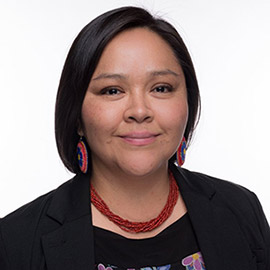
Jaime Gloshay, Loan officer at Acción and Co-Founder of the Native Women’s Business Summit
Natalia: Hi everyone, it’s Natalia, host and creator of Pitch Makeover and I’m in the studio in Albuquerque with Jaime Gloshay. Jaime is also the co-founder of Native Women’s Business Summit and White Mountain Apache, Diné-Navajo, and Kiowa. Welcome Jaime!
Jaime: Hi, thank you for having me. I’m so happy to be here.
Natalia: Tell us about your Investor Take for entrepreneurs?
Jaime: For entrepreneurs, I’d really suggest envisioning what it is you’re going to with your business. Whether it’s what product your going to offer, what service you’re going to create, but really using your imagination to see what that end goal looks like. I like to connect with entrepreneurs and I can really get a definite sense when they’ve aligned their thoughts, their words, their actions with their ultimate intention, with their goal. And finding that balance between grounding yourself, being very honest and truthful with where you’re at, what stage you’re at, what you need, and having that end goal, that dream. That idea of what this product or service can really manifest. I would also say with this envisioning piece: looking and believing and having faith that this is part of your journey. This is part of your story.
[Music plays]
Vanessa Roanhorse: Hi, I’m Vanessa Roanhorse with the Native Women’s Business Summit. This year’s event is coming up April 5th and 6th at the Isleta Resort and Casino on Isleta Pueblo, 15 miles from the City of Albuquerque. For tickets and more information, please visit nativewomenlead.org. We hope to see you there.
